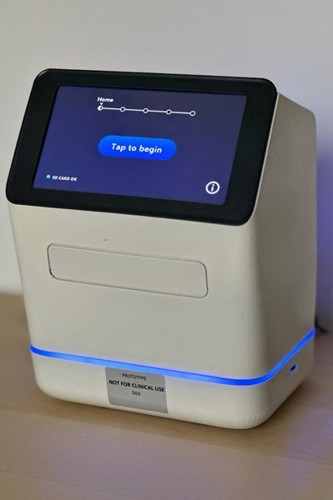During the pandemic, the MedTech company Diagonal Bio was established in Lund with the vision to limit the spread of infectious diseases worldwide by creating a universal diagnostic platform, PANVIRAL. The platform should have the same accuracy as today's PCR-based technologies but deliver diagnosis within 10-15 minutes for multiple infectious diseases and/or patients in parallel. The idea was that this diagnostic platform could eventually be used at Point-of-Care, i.e., directly near the patients, at low cost and with extreme ease of use.
New platform technology in only two years
In just two years, Diagonal Bio has developed an entirely new and patented platform technology, where electrochemical sensors, in combination with LAMP (Loop Mediated Isothermal Amplification), can detect genetic markers in essentially any genetic material (DNA or RNA) for any organism (humans, animal, plant, bacteria, viruses etc.). The technology, which has the potential to cut costs compared to traditional PCR-based technologies by up to 70 %, is already patented, and the company is listed on the Nasdaq stock exchange in Stockholm.
The platform technology is based on three components: an instrument plus two types of consumables (cartridge and reaction mixes). The cartridge, which is currently prototype-manufactured in collaboration with Protolabs, is designed to run eight samples in parallel. This enables the detection of up to eight genetic markers in parallel within 10-15 minutes. In comparison, standard PCR-based methods where a sample has to be sent to a centralised lab for purification by expensive and complicated machinery before being analysed often mean that the result takes from several hours (at best) to several days (in general).
One of the applications for the new technology developed by Diagonal Bio is for fast, accurate, cost-efficient, Point-of-Care diagnosis, for example, at private clinics, hospitals, workplaces, airports, during surgery etc., where quick and accurate diagnosis would enable fast and correct treatment early on for patients, hence enabling speedier recovery, fewer complications and save lives and limit the spread of infectious disease.
Fast development
High quality is never an accident but requires informed decisions, hard work and experience. This is why Diagonal Bio has chosen to work with the fast-growing Swedish product development company OIM, and Protolabs, the world's fastest digital supplier of prototypes and components in small volumes.
Diagonal Bio uploaded its first CAD drawings of the prototype into Protolabs' automated solution and immediately received an initial analysis of how easy and cost-effective it would be to manufacture the first cartridge design. Unique to Protolabs are the technical consultants with expertise in manufacturing who then, together with Diagonal Bio, fine-tuned and optimised the design – a process that continues to develop. Diagonal Bio's CEO, Jack Egelund Madsen, explained:
"The process worked very smoothly and was very easy. The cartridge is produced by injection moulding. Making the mould took a total of four weeks from the first upload of our CAD drawings. From there, it only took a couple of days before we received the first prototypes:"
The patented platform technology has a wide range of possible uses, as many sectors can benefit from quick, accurate and cost-effective detection of multiple genetic markers in parallel in essentially any genetic material within 10-15 minutes, directly at the place of sampling.

LAMPlify – a commercial system for the less regulated market segments
One of Diagonal Bio´s focus areas for 2023 (Focus 2023 | Diagonal Bio) is to develop the first commercial system, LAMPlify, for the less regulated market segments, for use as a general laboratory equipment, for example, in research laboratories and the food/feed/agricultural/veterinary sectors.
Jack Egelund Madsen continued:
"The first version of our instrument, which is for Research Use Only (RUO), was delivered by OIM on 5 October 2022. Now we have begun our very important validation process with external partners and collaborators.
PANVIRAL – a commercial system for in-vitro diagnostics
Diagonal Bio´s ambition is still to develop the PANVIRAL systems as a universal in-vitro diagnostic system for infectious diseases, at a later stage.
Revenue generated from LAMPlify could be used to co-fund the regulatory process which is required to get PANVIRAL to market as a CE-marked in-vitro diagnostic instrument according to EU-IVDR/US-FDA for use in human healthcare, where infectious diseases such as covid, antimicrobial resistance (AMR), sexually transmitted diseases (STDs), pneumonia, Ebola or other infectious diseases that can be diagnosed using genetic markers. The technology also has the potential to diagnose certain types of cancers or genetic disorders.
"The only requirement is that the sample analysed contain genetic material, and that the genetic code (DNA or RNA) for the target (genetic marker) is known," explained Jack.
Development continues
"Although we already have the first version of the instrument for RUO ready, there is still ongoing development as we plan to tailor the technology for use in various market segments," Jack continued. "Working with Protolabs in this phase has proven very efficient, and we are now continuing to develop the solution iteratively.
"Together with Protolabs, we can change and refine our cartridge design as we get new ideas and quickly and cost-effectively receive modified prototypes for evaluation. We're really looking forward to the continued exciting development with Protolabs," Jack Egelund Madsen concluded.
Want to learn more about how Protolabs supports similar businesses with CNC machined, injection moulded and 3D printed custom parts? Click here to check out their other case studies.











